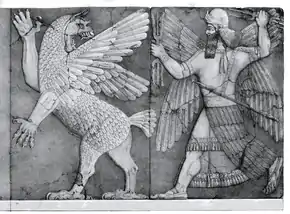Mummu
Mummu is a Mesopotamian deity. His name is an Akkadian loanword from Sumerian "umun", which translates as "main body, bulk, life-giving force" and "knowledge" as the active part in contrary to the more lethargical primordial forces Tiamat and Apsu (Sumerian Abzu).[1]
| Part of a series on |
| Ancient Mesopotamian religion |
|---|
 Chaos Monster and Sun God |
| Related topics |
He appeared in the Babylonian creation myth, the Enuma Elish as the vizier of the primeval gods Apsû, the fresh water, and Tiamat, the salt water.[2] and sometimes referred to as their son. Towards the middle of Enuma Elish, Ea locks Mummu and Apsu away. Mummu is also one of the names given to Marduk, the ultimate victor over Tiamat.[1]
Mummu is a craftsman, the personification of practical knowledge and technical skill. As the third of the primordial gods, Mummu symbolizes the mental world, the logos.[1]
The word mummu appears also in the Sumerian myth of Zu where Imdugud, whose name is translated as 'flashing wind', steals the Tablets of Destiny but in turn is defeated by Ningirsu. In their battle an arrow in midair is ordered to return to its 'mummu', which in this case meant the shaft's return to the living reed from which it was cut, the guts return to the animal's rump and finally the feathers to the bird's wings. Therefore, in a larger magnitude, mummu is detransformation, the return to chaos, demanifacturing. [1]
Fringe theories
- In his fringe theories, Zecharia Sitchin (wrongly) identifies Mummu with the planet Mercury, and notes similarities between Mummu and the Roman god Mercury as messenger deities.[3]
In popular culture
- In Robert Shea and Robert Anton Wilson's Illuminatus! Trilogy, Mummu is the patron of an ancient anarchist faction, the Justified Ancients of Mummu, that first rebels against and later joins the Illuminati. This inspired The KLF, a British 1980s acid house band, to adopt "The Justified Ancients of Mu Mu" as an alias.
Notes
- "Enuma Elish - The Babylonian Epic of Creation - Full Text". Ancient History Encyclopedia. Retrieved 2019-05-02.
- Liebowitz Knapp, Bettina (1997). Women in myth. SUNY Press. p. 270. Retrieved 17 June 2009.
- https://www.google.co.nz/books/edition/The_12th_Planet_Book_I/ZVooDwAAQBAJ?hl=en&gbpv=1&printsec=frontcover
References
- Sandars, N. K. Poems of Heaven and Hell from Ancient Mesopotamia. Harmondsworth: Penguin, 1971.